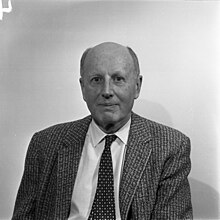Arthur Herbert Copeland
Appearance
(Redirected from Arthur Copeland)
Arthur Herbert Copeland | |
|---|---|
 Copeland in 1964 | |
| Born | June 22, 1898 |
| Died | July 6, 1970 (aged 72) |
| Nationality | American |
| Known for | Copeland-Erdős constant Copeland's method |
| Scientific career | |
| Fields | Mathematics |
| Institutions | Rice University University of Michigan |
| Doctoral advisor | O. D. Kellogg |
| Doctoral students | Ronald Getoor Howard Raiffa |
Arthur Herbert Copeland (June 22, 1898 Rochester, New York – July 6, 1970) was an American mathematician. He graduated from Harvard University in 1926[1] and taught at Rice University and the University of Michigan. His main interest was in the foundations of probability.[2][3]
He worked with Paul Erdős on the Copeland-Erdős constant. His son, Arthur Herbert Copeland, Jr. (1926-2019), was also a mathematician.[4]
Copeland published a paper about pairwise voting, which was very similar to the work of Ramon Llull and Marquis de Condorcet. The system he described became known as "Copeland's method".
Selected works
[edit]- Copeland, A. H. (1927). "Note on the Fourier development of continuous functions". Bull. Amer. Math. Soc. 33 (6): 689–692. doi:10.1090/s0002-9904-1927-04457-3. MR 1561449.
- Copeland, A. H. (1928). "Types of motion of the gyroscope". Trans. Amer. Math. Soc. 30 (4): 737–764. doi:10.1090/s0002-9947-1928-1501456-4. MR 1501456.
- Copeland, A. H. (1936). "A mixture theorem for nonconservative mechanical systems". Bull. Amer. Math. Soc. 42 (12): 895–900. doi:10.1090/s0002-9904-1936-06461-x. MR 1563461.
- Copeland, Arthur H. (1937). "Consistency of the conditions determining Kollektivs". Trans. Amer. Math. Soc. 42 (3): 333–357. doi:10.1090/s0002-9947-1937-1501925-2. MR 1501925.
- Copeland, A. H. (1937). "A new definition of a Stieltjes integral". Bull. Amer. Math. Soc. 43 (8): 581–588. doi:10.1090/s0002-9904-1937-06610-9. MR 1563591.
- "The Teaching of the Calculus of Probability". Notre Dame Mathematical Lectures, Number 4. Notre Dame, Indiana: University of Notre Dame Press. 1944. pp. 31–43.
- with Paul Erdős: Copeland, Arthur H.; Erdös, Paul (1946). "Note on normal numbers". Bull. Amer. Math. Soc. 52 (10): 857–860. doi:10.1090/s0002-9904-1946-08657-7. MR 0017743.
- with Frank Harary: Copeland, Arthur H.; Harary, Frank (1953). "The extension of an arbitrary Boolean algebra to an implicative Boolean algebra". Proc. Amer. Math. Soc. 4 (5): 751–758. doi:10.1090/s0002-9939-1953-0057229-5. MR 0057229.
- Geometry, Algebra, and Trigonometry by Vector Methods. NY: Macmillan. 1962, 298 pp.
{{cite book}}: CS1 maint: postscript (link)
References
[edit]- ^ Arthur Herbert Copeland at the Mathematics Genealogy Project
- ^ "Arthur Herbert Copeland Sr. | Faculty History Project – U. of Michigan". Archived from the original on 2017-12-02. Retrieved 2013-01-17.
- ^ Arthur Herbert Copeland - John Simon Guggenheim Memorial Foundation
- ^ "Arthur H. Copeland". Legacy.com.
